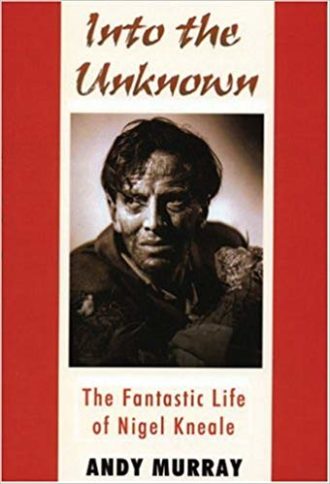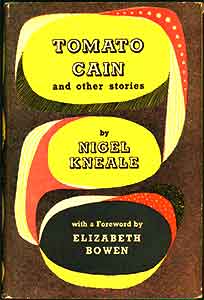 By ANDY MURRAY (Headpress; 2006)
By ANDY MURRAY (Headpress; 2006)
England’s Thomas Nigel Kneale (1922-2006) was and is one of the guiding lights of modern horror, and this terrific biography is long overdue. Kneale was unique for having made his mark on the genre almost entirely through screenwriting, and having done so primarily for English television. This explains, I guess, why he isn’t as well known as he should be, even though the Kneale scripted QUATERMASS BBC serials are among the most widely viewed programs (in their native England at least) in television history.
As revealed in INTO THE UNKNOWN, Nigel Kneale was a man of near-universal contradiction. His colleagues claim he was a nice guy yet he comes off as a bit of a curmudgeon, having been unabashedly outspoken in his dealings with the notoriously hard-lined BBC and nixing an offer to write for THE X-FILES because (speaking of the series’ leads) “you’ve got two non-actors there, and I’m not keen to write for them!” He also had a no-tolerance policy about anyone tampering with his scripts (having removed his name from HALLOWEEN III when John Carpenter dared mess with Kneale’s original screenplay) yet had no problem tinkering with the many novels he adapted for the BBC, which included classics like 1984 and LORD OF THE FLIES. In addition, Kneale turned down repeated invitations to write for DR. WHO because he felt the series was too frightening for children, yet scared the shit out of countless kids with his own programs. Perhaps most inexplicably, Kneale stated on numerous occasions that he had no interest in science fiction or horror, yet spent the majority of his career working in those very fields.
 Kneale’s penchant for the horrific and fantastic emerged from growing up on the Isle of Man, whose culture is steeped in myth and superstition. His first writing efforts were in the form of short stories, several of which were published in the 1949 collection TOMATO CAIN AND OTHER STORIES. Finding prose fiction unsatisfying, Kneale drifted into acting for a brief period, and then in 1951 started writing for the BBC. He began as a scripter of children’s shows and in a short time was signed to the BBC drama unit, adapting several famous novels to the small screen. Then in 1953 Kneale was asked to provide content for a time period when nothing was currently scheduled, and responded with a six part serial called BRING SOMETHING BACK…!, which eventually saw broadcast as THE QUATERMASS EXPERIMENT. Ingeniously mixing science fiction and horror tropes in a manner that was without precedent in 1953, the program was a groundbreaking hit.
Kneale’s penchant for the horrific and fantastic emerged from growing up on the Isle of Man, whose culture is steeped in myth and superstition. His first writing efforts were in the form of short stories, several of which were published in the 1949 collection TOMATO CAIN AND OTHER STORIES. Finding prose fiction unsatisfying, Kneale drifted into acting for a brief period, and then in 1951 started writing for the BBC. He began as a scripter of children’s shows and in a short time was signed to the BBC drama unit, adapting several famous novels to the small screen. Then in 1953 Kneale was asked to provide content for a time period when nothing was currently scheduled, and responded with a six part serial called BRING SOMETHING BACK…!, which eventually saw broadcast as THE QUATERMASS EXPERIMENT. Ingeniously mixing science fiction and horror tropes in a manner that was without precedent in 1953, the program was a groundbreaking hit.
Kneale provided further Quatermass serials, specifically QUATERMASS II (1955) and QUATERMASS AND THE PIT (1958/59)—both of which, like THE QUATERMASS EXPERIMENT, were made into popular feature films by the legendary Hammer productions—as well as the rather less successful QUATERMASS/THE QUATERMASS CONCLUSION (1979). Other noteworthy Kneale scripts included the BBC dramas THE YEAR OF THE SEX OLYMPICS (1968, see below) and THE STONE TAPE (1972), the feature films LOOK BACK IN ANGER (1958), THE ENTERTAINER (1960) and THE WITCHES (1961), the anthology program BEASTS (1976) and the sitcom KINVIG (1981). Sadly, a great deal of Kneale’s television work is now lost, having been blithely erased from existence by clueless programmers, but what remains is mighty impressive.
In this book Andy Murray does a fine job guiding us through his subject’s life and accomplishments, complete with testimonials from figures like Grant Morrison, Ramsey Campbell, Dan O’Bannon and Kim Newman about Kneale’s continued influence. Where Murray doesn’t quite succeed is in illuminating or explaining Kneale’s contradictory personality, although at this point I doubt anyone ever will. There may be more books about Nigel Kneale in the future, but I strongly doubt any will outdo this one.
